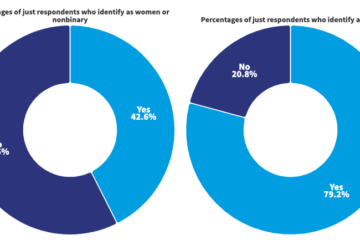Iowa’s law requiring representation of women in government is in jeopardy, and advocates say that ditching its nearly four-decades-old provisions would be a mistake.
The state started in the 1980s requiring that appointments to state boards and commissions result in gender-balanced boards. About 12 years ago the rules were expanded, with some additional leeway, to cover panels appointed by counties and cities. But a state panel is recommending repealing the law in order to “allow the most qualified Iowans to serve.”

Terese Grant, president of the League of Women Voters of Iowa and a Grinnell resident, said the benefits of gender balance are evident.
“I think it just benefits everybody, because then decisions are made that are representative of the constituents,” she said.
How we got here: Panel makes suggestions for streamlining government
The proposal comes out of a broad effort to streamline state government. The state Legislature this year formed a temporary Board and Commissions Review Committee to examine the viability of hundreds of panels established by state law where Iowans, mostly volunteers, provide advice and oversight on a broad range of state functions.
Over the summer, the committee held one public hearing and produced a report of recommendations for the Legislature, which it approved Sept. 25.
Most of the proposals deal with eliminating or combining boards or revising their duties, but the committee also made a series of overarching recommendations. One of them was to eliminate Iowa Code Section 69.16A, first approved in 1986, and similar rules elsewhere in state law that require state boards to have close to an equal number of men and women in most circumstances. The requirements were expanded to appointed panels in local government in 2012. (Iowa Gov. Kim Reynolds, then a state senator, voted against the expansion.)
The committee recommendations are not binding. The Legislature, which next meets in January, must amend state law to implement any of them.
Iowa’s law produces tangible benefits, advocates say
Some Iowa leaders who advocate for women’s rights expressed dismay about the proposal.

Karen Kedrowski is a professor of political science and director of the Carrie Chapman Catt Center at Iowa State University. She said that about a dozen states have recommendations for state-level positions but that Iowa’s requirement, that half or nearly half of each panel be women, stands alone.
“When we look at the 38 states or so that don’t have any recommendation or mandate, what we see is that men are overwhelmingly overrepresented on state level boards and commissions,” Kedrowski said. The exceptions usually fit stereotypes: women making up half or the majority of boards dealing with the arts or preservation, she said.
“So mandates matter and they do ensure more diversity.”
Grant, the League of Women Voters Iowa president, said the law is serving its purpose and should be retained. She said the proposal to appoint “the most qualified” people raises many questions.
“It seems to me that that language is trying to be exclusive rather than inclusive,” she said. “What do you mean by ‘qualified,’ anyway?”
Grant also expressed concern about separate proposals to consolidate various commissions for people of color, as well as the Iowa Commission on the Status of Women. “I really have my doubts that one organization could serve all of them equally,” she said. “Somebody is not going to get the attention and representation and work that that particular group needs, and they all need it.”

Keenan Crow, director of policy and advocacy at One Iowa, a statewide LGBTQ advocacy organization, said Iowa’s law “continues to accomplish its goal over and over and over again. Everybody who has analyzed it in a serious capacity has come to that conclusion.”
Crow added: “It’s going to have a lot of negative impacts, not just in terms of the opportunities that Iowa women and girls get, but also in terms of how people view our government and how people view their ability to have an impact on our government.”
Opponents: Quotas are illegal, outdated, unnecessary
The law’s opponents say that gender-based quotas should have no place in Iowa. They cause harm and complications that outweigh any benefits, they have said.
Two Iowa lawyers challenged Iowa’s laws in federal court last year with the aid of the Pacific Legal Foundation. Rachel Raak Law of Correctionville and Micah Broekemeier of Iowa City said they wanted to be run for election this year to be on the panel that recommends judges for the state appellate courts but were not eligible because the election in Raak Law’s area was for a man and the one in Broekemeier’s area was for a woman. A federal judge declined to intervene before the election, although the lawsuit is continuing with another plaintiff who is ineligible for a 2025 election for the judicial nominating commission.
“This committee and Gov. Reynolds should ensure that all Iowans are treated equally before the law and that no one should be excluded from public office because of their gender,” Pacific Legal Foundation attorney Laura D’Agostino testified before the board’s review commission in early September. “Gender quotas not only prevent qualified people from serving and further impose logistical problems and filling seats, but they are unconstitutional and violate the 14th Amendment.”
State Sen. Jason Schultz, a Republican from Schleswig, helped advance a bill to repeal the gender-balance laws in January, although it never advanced to the Senate floor. “The law has to change along with the culture, which no longer needs a quota system,” Schultz said at a subcommittee meeting, according to the Iowa Capital Dispatch. “Looking for the best, most qualified people is a better way to go.”
Schultz wrote in the spring that many Iowans, including in the governor’s office, thanked him for bringing the bill forward because it complicates their work to fill boards. “The opposition to the bill has centered upon left-wing social engineering advocates who seek mandates to enforce their will,” he wrote.
Schultz did not answer an emailed request for comment from the Business Record/Fearless.
The review committee’s final, unsigned report says that “legislative history clearly indicates the goal of the gender-balance requirement was to place more Iowa women into places of leadership in state government” and notes that, since the 1980s, Iowa has elected a female governor and currently has a 50% female congressional delegation. This illustrates “that Iowans have changed their collective mind on any perceived inequities between men and women representing the State of Iowa in leadership positions,” the report says.
Professor: Women are qualified, even if they often downplay their experience
Kedrowski, the Iowa State professor, also took note of the proposal about “qualified” Iowans.
“We do know that women tend to discount their own qualifications. We see this all the time when trying to recruit women to run for public office,” she said. When it comes to appointed positions, “women might say, you know, ‘I don’t know anything about aviation, so I can’t be on an airport board.’ But we don’t know that the men who are going on the airport board have any more qualifications than women do.”
It’s important for boards that handle occupational licensing and oversight to have experts, and that a more limited pool might make gender balance harder to achieve, Kedrowski said. But the benefits of equal representation apply just as much, and “harder” is a long way from “impossible.”
“There is nothing that indicates that a mandate such as the gender balance law in any way means that you cannot find qualified candidates,” she said. “You just have to look in places that you might not be accustomed to.”
Put bluntly, “the power brokers might have to look elsewhere besides who they play poker with, who they play golf with, who they know through their business contacts, and be able to think more creatively,” Kedrowski said.
RELATED STORY (from January): Bill proposed to eliminate gender balance law for boards and commissions


